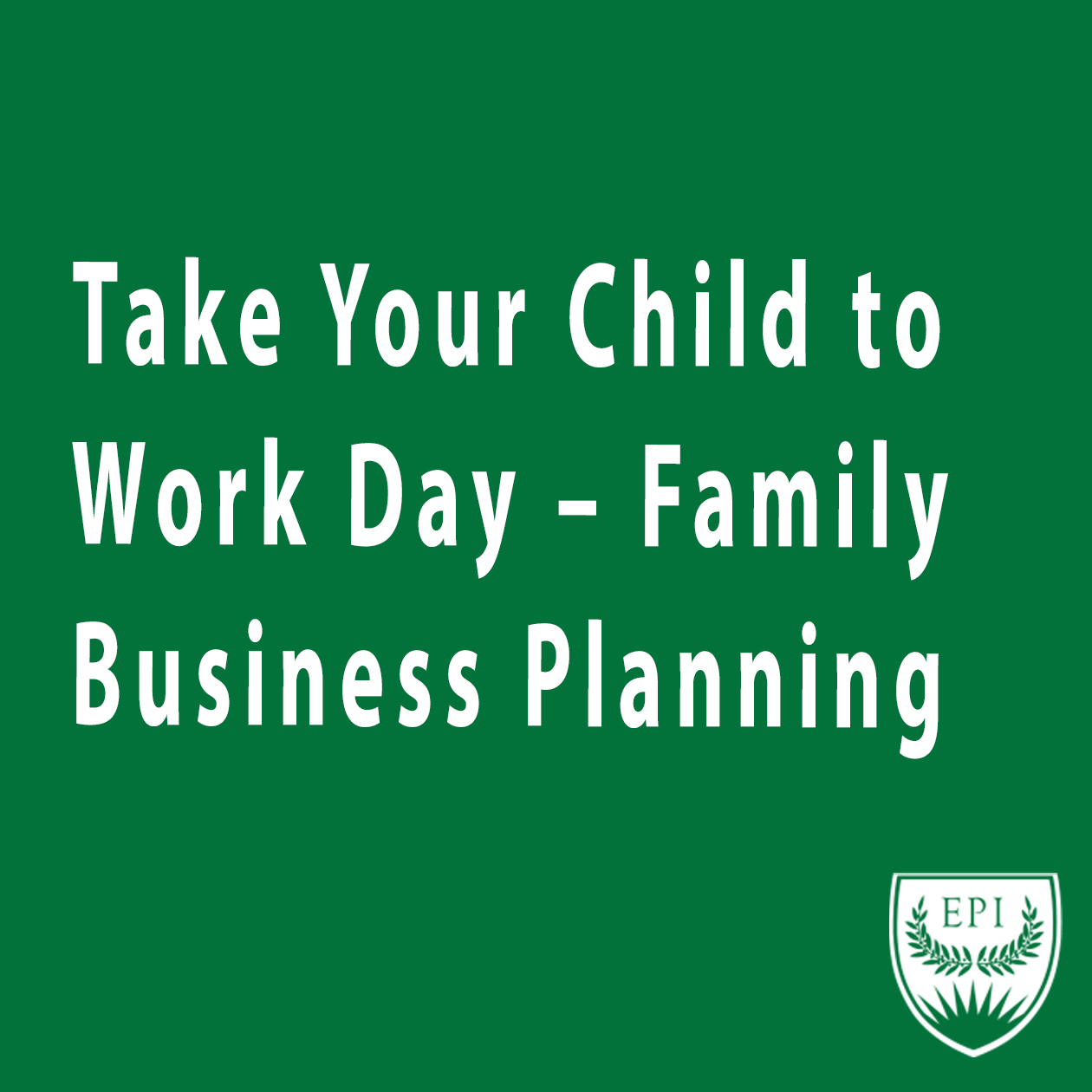
THE EXIT PLANNING BLOG
Keep up-to-date with exit planning, succession planning, industry trends, unique specialty insights, and useful content for professional advisors and business owners.
Share this
Take Your Child to Work Day – Family Business Planning
by Colleen Kowalski on April 22, 2021

Marketing Coordinator, Colleen Kowalski, shares her experience visiting her father at the family business on “Take Your Child to Work Day”.
As a small child, I vividly remember going to my father’s office on “Take Your Child to Work Day”. I was 9 years old and had only the vaguest idea of what his job entailed. All I knew was that my dad was the President and Owner of the company, my aunt and uncle worked down the hall from him, and on his desk, beneath a large family portrait, was a large glass bowl of A&W Root Beer hard candies. I spent the morning listening to my dad speak with potential customers, took a tour of the factories, and of course, ate more than my fair share of root beer candies. After spending the day with my dad, I learned more about the history of the family business and what my father did daily. In a family-owned business, Take Your Child to Work Day is the first chance for a potential successor to learn the business.
Family Business Statistics
According to a 2009 study conducted by OnStartUps, 48.1% of entrepreneurs said they grew up in a family business. Family-controlled businesses make up over 35% of Fortune 500 companies. The success of family businesses can be attributed to company culture and high employee retention rates compared to other companies. Family Business Center states, “Family businesses retain talent better than their competitors do. They create a culture of commitment and purpose, avoiding layoffs during downturns, promoting from within and investing in people”. According to a Harvard Business Review study, only 9% of family business work forces are turned over annually, versus 11% at non-family firms. They also share that 72% of family businesses feel that they have a stronger company culture because they do not measure their success based off numerical data and profit.
In addition to the strong employee culture created in family businesses, the role of women in family businesses differs from non-family business. According to Fortune Magazine, “Of the non-family firms in the Fortune 1000, only 2.5% are currently led by women”. In contrast, “24% of family businesses are led by a female CEO or President and 31.3% of family businesses surveyed indicate that the next successor is a female. Nearly 60% of all family-owned businesses have women in top management team positions”, according to a 2007 Mass Mutual American Family Business Survey.
Exit Planning in a Family Business
My father bought the family business from my Grandfather before I was born, making him a second-generation owner. According to Businessweek, “About 40% of U.S. family-owned businesses transition into a second-generation businesses, approximately 13% are passed down successfully to a third generation, while 3% survive to a fourth or beyond”. The transfer of the business from my grandfather to my dad was successful because it was not a simple “handshake agreement”, but a legal sale of the company from one party to another, the two parties just happened to have the same last name.
According to Walking to Destiny, “About half of business owners want to exercise the option of an intergenerational transfer, but in reality, only about 30% actually do so”. Some family business owners fall into thinking that since they want to transfer the business to their children, they do not need to make an exit plan. The Family Business Center states that 43% of family business owners have no succession plan in place. This way of thinking can be detrimental to the future successes of the business – as well as family relationships. Without a proper succession plan in place, the next generation of the family business will be given a business that lacks the organization needed to thrive – if they even want to take over the business.
The reason many current family business owners do not have a succession plan is that they do not have any plans to retire anytime soon. It is estimated that about 40% of family business owners expect to retire but less than half have a successor selected. In a family business, a successor can learn on the job and experience every aspect of the business, making them uniquely prepared to lead the company after the current generation retires. However, if the current owner does not have a successor selected, the amount of time available to train the future leader of the family business diminishes, as does the potential success of the company.
“Our Business is like a Family to Me”
While most businesses like to say that their employees are “like family” to them, in a family business this is literally the case. Take Your Child to Work Day is the perfect day to introduce your young children to what you do for a living and, if your child is as adorable as I was at 9 years old, provide your employees with the gift of a tiny blonde kid wearing overalls and a hard hat giving them hard candy as “a raise”. The day also acts as a reminder for owners on the verge of retirement to discuss exit plans with their potential successors.
Happy Take Your Child to Work Day, from all of us at Exit Planning Institute!
Share this
- Blog (520)
- CEPA (367)
- exit planning (243)
- CEPA community (181)
- Business Owner (135)
- Exit Planning Summit (85)
- EPI Chapter Network (82)
- Exit Planning Partner Network (76)
- EPI Announcement (49)
- Content (48)
- Value Acceleration Methodology (46)
- Webinars (37)
- Excellence in Exit Planning Awards (32)
- Marketing (30)
- 2024 Exit Planning Summit (28)
- 5 Stages of Value Maturity (26)
- Books (24)
- Exit Planning Teams (22)
- EPI Team (21)
- 2023 Exit Planning Summit (20)
- Leadership (20)
- family business (19)
- women in business (19)
- Intangible Capital (18)
- Exit Options (17)
- Black Friday (16)
- EPI Academy (16)
- CPA (15)
- State of Owner Readiness (14)
- Chapters (12)
- Chris Snider (12)
- National Accounts (12)
- Small business (12)
- Walking to Destiny (12)
- charitable intent (12)
- personal planning (12)
- Financial Advisors (9)
- 5 Ds (8)
- About us (8)
- Podcast (8)
- Insiders Bash (7)
- Scott Snider (7)
- Christmas (6)
- Exit Planning Content Library (6)
- Case Studies (5)
- Owner Roundtables (5)
- Season of Deals (5)
- Value Advisors (5)
- financial planning (5)
- Awards (4)
- Exit & Succession (4)
- Five Ds (4)
- executive training (4)
- Circle of Excellence (3)
- Owners Forum (3)
- forbes (3)
- EPI Thought Leadership Council (2)
- Exit Is Now Podcast (2)
- Peter Christman (2)
- Three Legs of the Stool (2)
- Veteran (2)
- Whitepapers (2)
- author (2)
- Business Owners Forum (1)
- DriveValue (1)
- business consultants (1)






